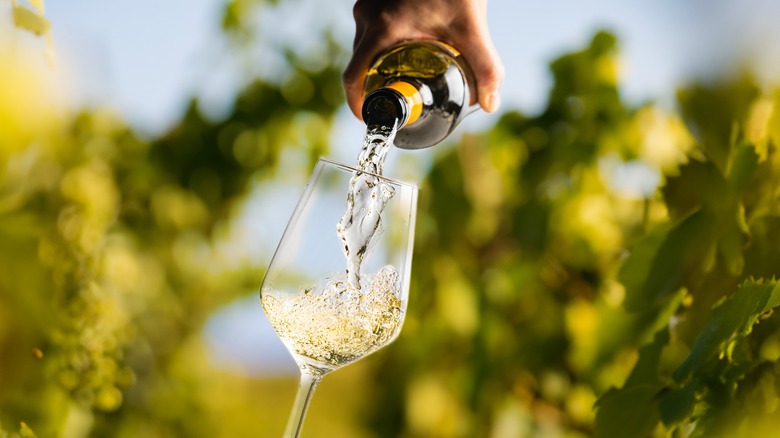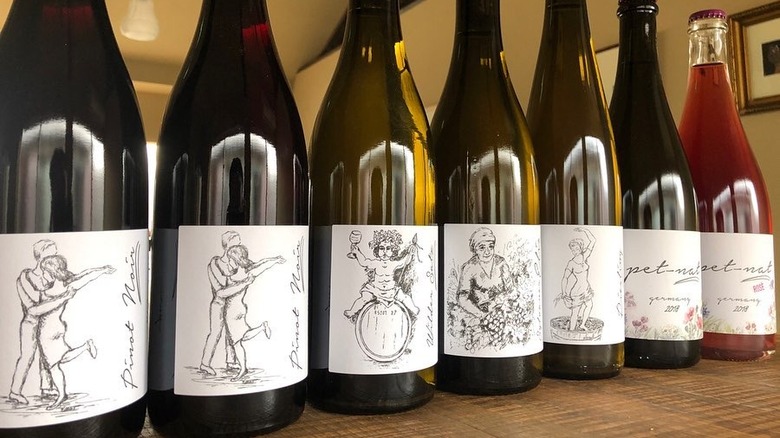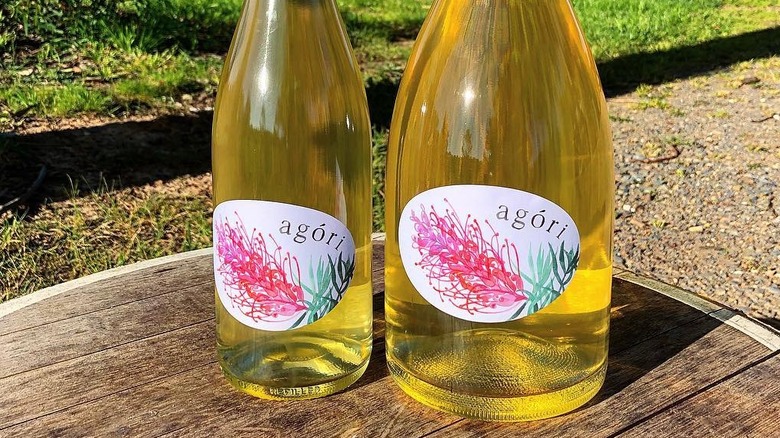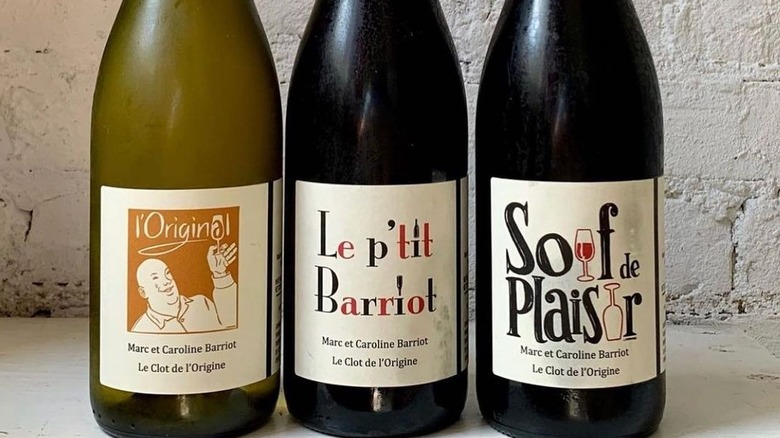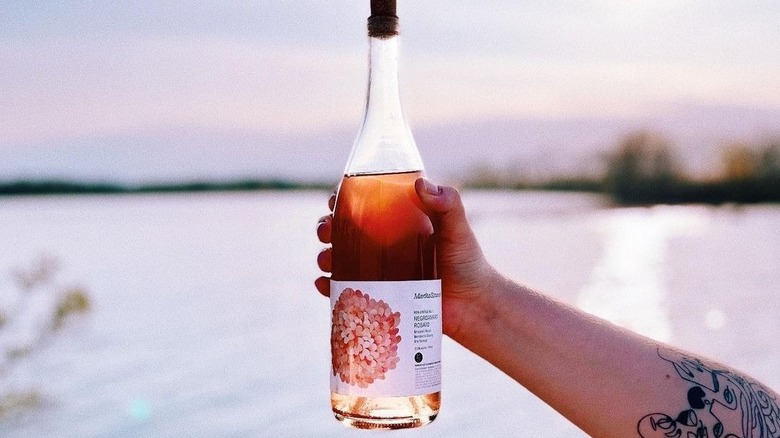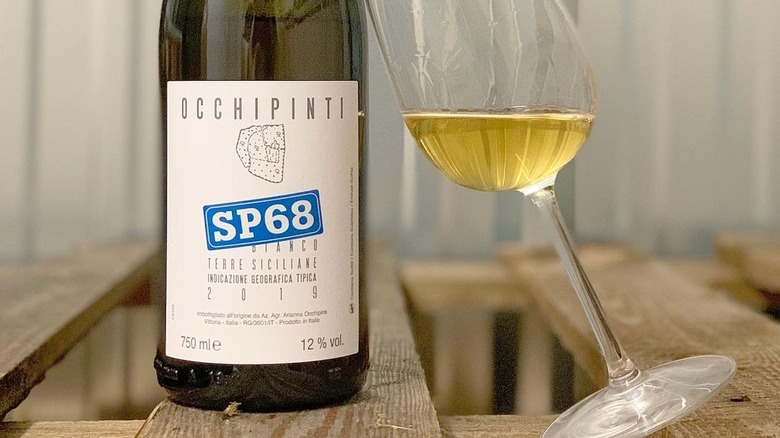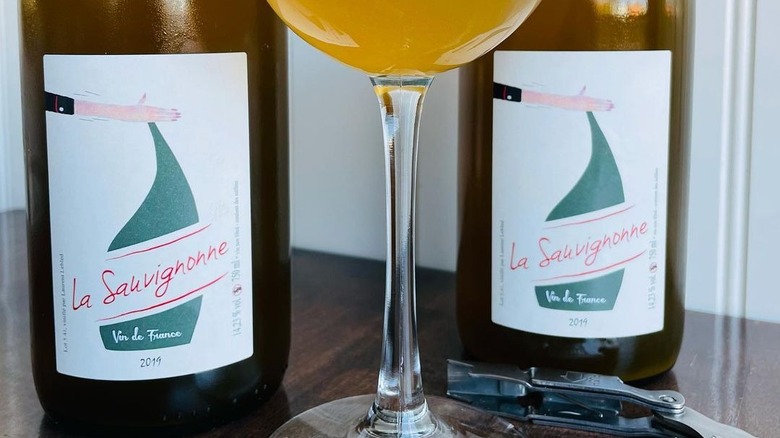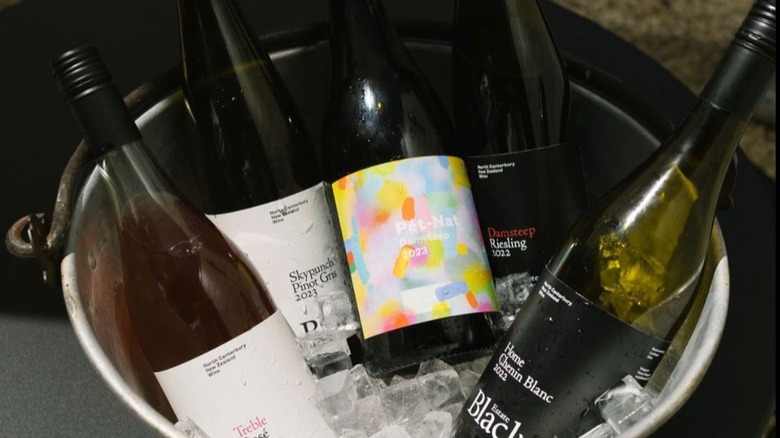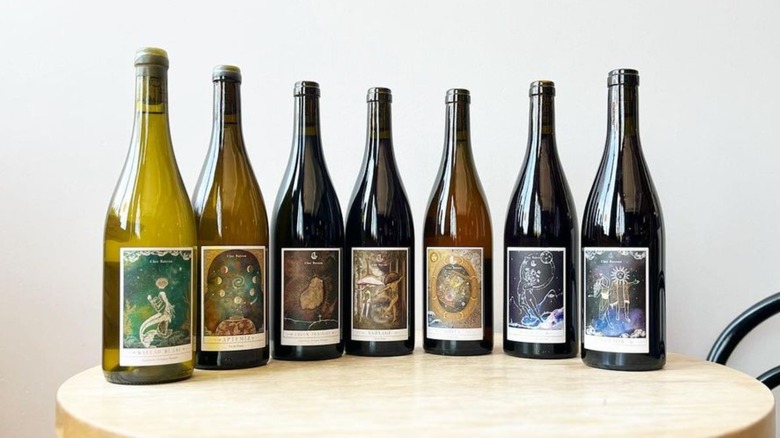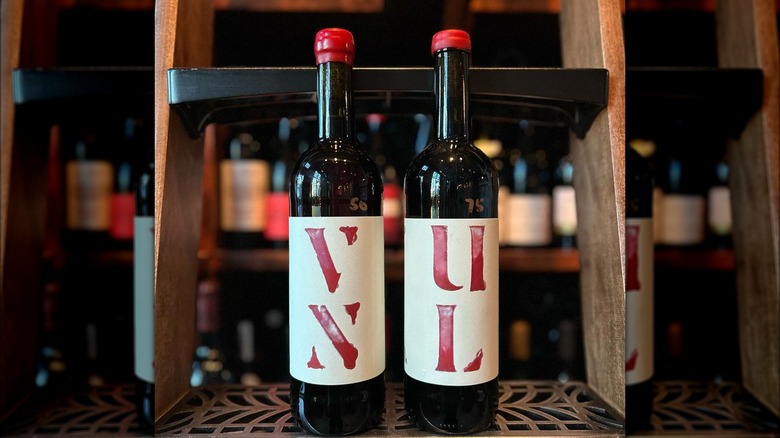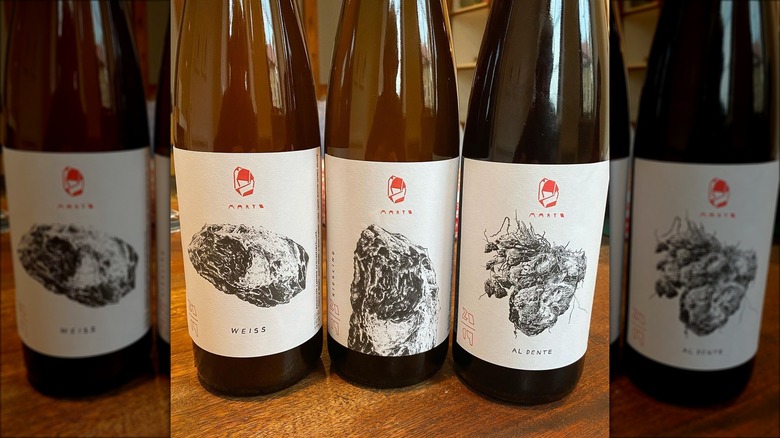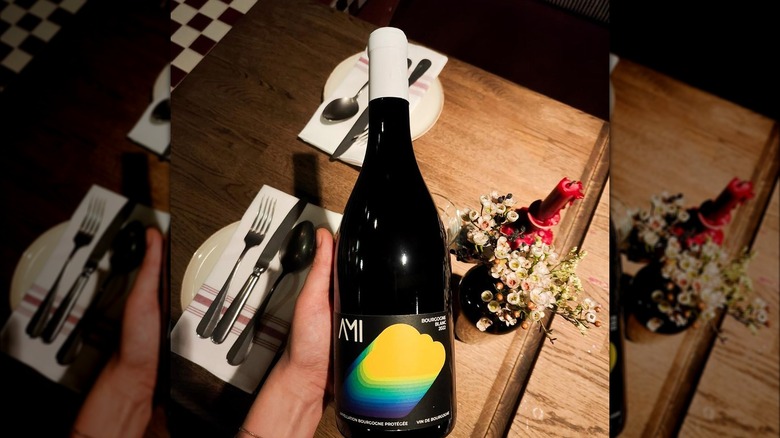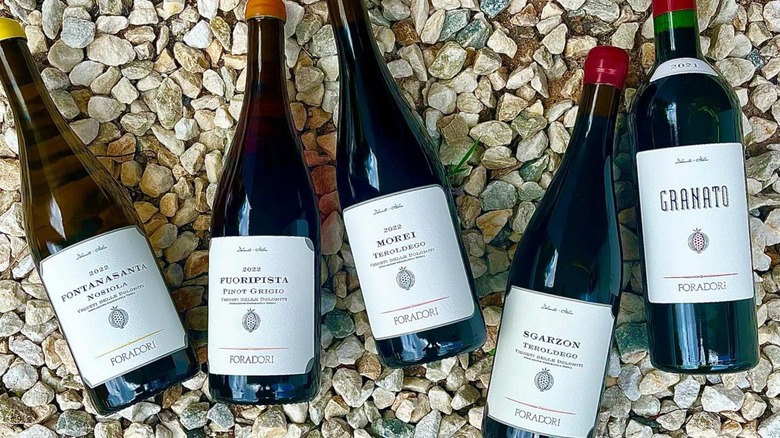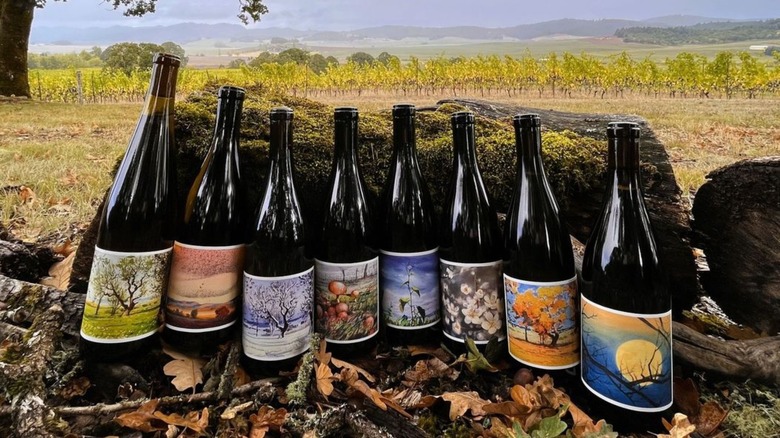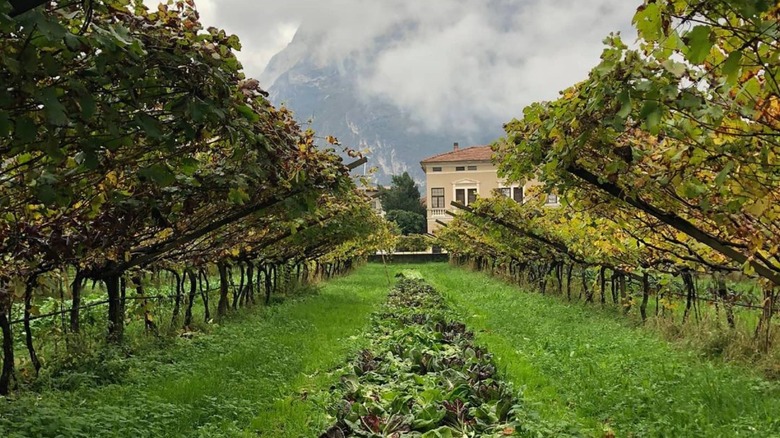12 Natural Wines To Drink In 2024
While natural wine isn't formally defined, the basic premise is that nothing is added nor taken away. When it comes to the nitty-gritty, every wine professional has their opinion on what should or shouldn't be allowed in the farming of the fruit or if adding 10 milligrams of sulfites during bottling is acceptable. What is clear is that natural wine, however seemingly trendy, has been around since the beginning of winemaking and it isn't going anywhere.
The popularity of natural wines may be attributed to a shift in values toward place-based, ecologically mindful products. The grapes often undergo organic or biodynamic growing regimes with fewer synthetic inputs like herbicides and pesticides, fermentation with indigenous yeasts rather than commercially cultivated ones, and rarely see any preservatives and stabilizing agents. "Natural" even extends to the aging vessels, which are selected to avoid adulterating the flavor of the wine. The result is a product that authentic represents time, place, and terroir and is alive with energy you can taste.
The following natural wine brands represent a breadth of diversity in growing regions, grapes, and winemaking styles, with each consistently producing compelling wines that tell an intimate story. We feel this list, which includes both up-and-coming producers and established classics, are natural wine brands to search out whether you are already entrenched in the natural wine scene or just starting your journey.
Brand Bros
Everything about Brand Bros is fun. Its labels, its website, the wine itself — all of them evoke a sense of playfulness and joy that reminds us winemakers needn't be stuffy, old-school gatekeepers. Founded by brothers Daniel and Jonas Brand in 2014, the winery sits in the far northern reaches of the Pfalz region of Germany, a place that enjoys little attention from either the German or international wine community. (Note that Pfalz itself is quite famous, but most of the "good" stuff happens far south of Brand's operation.) This semi-obscurity doesn't dampen the moods of Brand Bros, however. On the contrary, it energizes them.
Brand Bros uses organic practices, including the use of herbal extracts and tea to strengthen the vines and a reliance on bees and insects to create biological diversity that benefits their vineyard sites. The brand follows the general natural wine tenet of spontaneous fermentation with native yeasts, and all bottling is done without fining or filtration.
Next time you're at a wine shop, look for German bottles with scratchy ink drawings. The brothers' grandmother, Oma Helga, pens these label illustrations, and they look as good on your wine rack as they taste in the glass. Expect wild, funky, and lively wines that should be drunk young.
Travis Tausend
Travis Tausend is both the man and the brand. Tausend does nearly all the winery's work completely on his own, from bookkeeping and bottling to marketing and design. He accepts help only during harvest season when friends and family lend a hand to help him get grapes from the vineyard to the cellar. The Tausend winery is located in the Adelaide Hills of Southern Australia and produces wines from merlot, riesling, sauvignon blanc, and others.
Tausend considers his winemaking an art and believes that changes in taste and style from vintage to vintage come as much from external factors like seasonal climate as from internal variables like emotion, intuition, and personal growth. Travis Tausend wines are often wildly different from what one might expect of a given grape. His sauvignon blanc, for instance, might present as tangy, fresh, and citrus-driven one year and offer a funky, almost nutty quality the next. The ever-changing nature of the Tausend wines is what makes them so fun. If all you've experienced from Australian wine is Yellowtail, it's time to try something better. Give Travis Tausend a shot.
Clot de l'Origine
Founded by Marc Barriot in 2004, Clot de l'Origine earned its Agriculture Biologique (AB) certification in 2009 and has delighted consumers by producing natural wine of great quality and variety despite modest land holdings. The domain's success is due in part to the diversity of terroir its grape-growing parcels enjoy. Low-altitude sites like its Salses le Château and Espira de l'Agly vineyards abut the sea, lending freshness and salinity to the wines. Other inland vineyards sit at higher altitudes and have different soil types like brown schist and black shale that result in wines that are totally different from their seaside siblings.
Marc Barriot has run an organic shop since the beginning. Much of the domain's labor is done by hand, including manual harvest that uses no modern machinery. Grapes are de-stemmed and placed in concrete vats to macerate and ferment, and all bottling is done without fining or filtration.
These natural wines are a delightful cross of new-age sensibilities and old-school elegance. Clot de l'Origine is known especially for its blanc de noirs, a white wine made from red grapes. These often present as more textured, fuller whites that pair well with food.
Martha Stoumen
Martha Stoumen is the de facto queen of California natural wine. Though there's no official coronation for this sort of thing, it's hard to imagine anybody who's plugged into the California natural wine scene more than her. Stoumen's Post Flirtation series of wines has become famous throughout the United States for its cute labels and unbelievably consistent performance vintage after vintage. And Stoumen's lineup doesn't stop there. She's got whites, rosés, and reds aplenty and has even branched out into bottled wine spritzers and piquettes for your next picnic.
After traveling the globe for eight years and apprenticing with different winemakers, Stoumen settled in Northern California and began her own operation in 2014. The Stoumen brand is committed to farming practices that encourage soil and vine health rather than high yields, and it makes use of natural predators to handle pests instead of chemical deterrents. This is hyper-popular natural wine that doesn't compromise its practices to meet demand. The brand puts out exactly what its land allows each year and no more. We'll take it.
Arianna Occhipinti
In some of the more bohemian wine circles, wine appreciation often becomes a competition to see who can "enjoy" the funkiest, most technically flawed natty wines out there. This is a dangerous game, as it's apt to turn off would-be drinkers who try it and think all-natural wine is this barnyard-y, stinky swill.
Roundly rejecting that school of thought is Arianna Occhipinti, whose wines present as elegant, gorgeous masterpieces that hold their own against any of the precise traditionalists in Italy or France. Located in Sicily, the Occhipinti brand is committed to organic farming and natural winemaking. Occhipinti champions local Sicilian varietals like nero d'avola and frappato, and produces white from the muscat of Alexandria and albanello grapes.
There's no such thing as a "best" natural wine brand, but Occhipinti embodies everything we love about this genre: a deep respect for the land, low intervention in the cellar, and wines of quality that prove "natural" doesn't always mean "weird" and certainly doesn't mean "less than." In fact, it's often the best stuff available.
Laurent Lebled
Laurent Lebled is a tastemaker in the French natural wine scene, and the popularity of his wines among the natural wine crowd in the U.S. is hard to understate. There wasn't a whole lot of good to come out of the 2008 recession, but a small silver lining is that it robbed Lebled of his 30+ year career as a wood merchant. At the insistence of his friends Patrick Corbineau and Sébastien Bobinet, the freshly unemployed Lebled tried his hand at winemaking — a realm in which he had zero prior experience.
It turns out that Corbineau and Bobinet's instincts were right, as Lebled quickly found his winemaking voice. The natural wine scene is richer for it today. Though reds made from gamay, cabernet franc, and pinot noir were what first drew our attention to Laurent Lebled wines, our most recent fascination is with La Sauvignonne. Made from 100% sauvignon blanc, this is a white-meets-orange skin contact wine that has puckering acidity and incredible length. Keep an eye out for it.
Black Estate
Black Estate is splayed across the lush, rolling hills of North Canterbury on New Zealand's South Island. The original site was planted in 1993 by Russell and Kumiko Black. It changed hands in 2007 and is now owned and operated by Pen Naish, her partner, Nicholas Brown, and a helpful crowd of extended family. The three distinct vineyards, Home Vineyard, Damsteep Vineyard, and Netherwood Vineyard, make up just over 50 acres of vines combined.
The clay and limestone-based soils are planted with chardonnay, pinot noir, chenin blanc, cabernet franc, sauvignon blanc, and riesling. Black Estate's vineyards are farmed biodynamically following the initial conversion to organic practices. Besides just growing the grapes and making wine, Black Estate also offers an on-site restaurant, tours, and a tasting experience for guests.
Black Estate wines radiate with vibrancy and depth. The energy that goes into the holistically farmed land is reflected in the quality of the fruit, which is maintained through careful considerations during the winemaking process. The results are lively wines that express the grape's personality through a filter of the regional terroir. The cool climate keeps the natural acidity tight while an intuitive approach to the winemaking process gives the wines buoyant, concentrated flavor profiles.
Domaine Clos Bateau
Clos Bateau is born from self-proclaimed "new kids of Beaujolais," Sylvie de Visser and Thierry Klok. Both have backgrounds in the food and beverage industry and moved to Lantignié, in the northern part of Beaujolais, France, to grow wine. The vineyard only has 12.5 acres of vines, with a few more acres planted with fruit and nut trees. This biodiversity is just the start of the rich ecosystem the winemakers created. Along with an evolving food forest, a flock of sheep rotates through the vines to keep weeds at bay and provide valuable nutrients for the soil. de Visser and Klok operate within the biodynamic wine framework — which for them means working within the lunar calendar to choose the best time for herbal additions, pruning, bottling, pressing, and maceration.
Primarily working with gamay and chardonnay, with dabbled appearances of pinot noir and sylvaner, Clos Bateau exudes juicy energy that lies somewhere between the earthy and masculine foillard vintages and the bouncy, light-hearted expressions we often see of gamay today. These zero-zero wines are more than the up-and-comers of the region but rather have the potential to change the game of natural wines from the region.
Partida Creus
Partida Creus is the creative vision of Italian natives Antonella Gerosa and Massimo Marchiori, who moved to Spain's Penedes region in 2001 to start making natural wine. The couple quickly began to explore their new space, refurbishing an abandoned cottage and reviving old rows of indigenous vines, all while following a biodynamic farming approach.
Everything at Partida Creus leans heavily toward the low-intervention end of the spectrum of natural wine. The winery uses a mule and horse to work the land, when necessary, manually harvests the fruit, and creates authentic wines without the addition of any sulfur oxide. The focus here is on pure expressions of the native grapes, including sumoll, garrut, macabeu, and vermell.
Partida Creus has become a name-to-know on the global natural wine scene. The easily recognizable labels with large-format stamp letters can now be found at numerous good bottle shops and on wine lists at restaurants. Expect light-hearted, easy-drinking wines that will have you coming back for more. Partida Creus wines are honestly a delight to drink and breathe new life into the region's representation with a hint of Italian flair.
Marto Wines
Martin Wörner, one of the leading young winemakers from Germany, is quenching palates through his stunning line-up of crystalline natural wines. Wörner took over his family's vines, located in the Rheinhessen region, in 2016 after stints with well-known winemakers like Matassa and Gut Oggau.
Wörner established Marto Wines and began working with the grapes his grandfather planted years before. He deploys a series of organic and biodynamic practices, including integrating sheep into the vines and nourishing the soil through a smattering of cover crops. The brand focuses on high-elevation German classics like spätburgunder, weissburgunder, riesling, müller-thurgau, and scheurebe.
If you've had rigid German wines in the past, you are in for an awakening when you taste Marto wines. The wines are excitable with energy, driven by high acid, with a clarity that is direct and to the point — which is something Martin excels at coercing from the grapes. The wines vibrate at a high frequency, showcase the purity of the terroir, and combine German excellence with a creative edge to make perfection. Marto Wines are simply stunners, making it one of the best natural wine brands of the moment.
Ami
Ami was established in the Burgundy region of France. Both its vineyard manager and farmer bring wine experience and a unique piece to Ami that has shaped its concept and brand. Ami is a bold and zippy label, coming into the esteemed region with no intentions of following the rules. The brand makes wines that are fun, inspired, and approachable — something that can be challenging in an appellation that is so heady and well-defined. Overall, Ami's wines are a delight to drink.
Paul Perarnau and Willy Roulendes only work with about six acres of organically farmed clay and limestone-rich soil, and focus on single vintages of pommard and chardonnay — along with a few less obvious iterations that include aligoté, syrah, and gamay. Nearly all of its wines are aged in neutral oak, though the winery is dabbling a little bit with stainless for the white varietals. Its especially fun creations of co-macerated gamay, pinot noir, and aligoté are turning heads in the region. While Ami is a bit of a playful rebel on the Burgundy wine scene, it showcases the fun that can be had in the winemaking process — which translates effortlessly into the wine.
Foradori
Foradori has become one of the most iconic natural wineries in Italy. The undeniably stunning estate, nestled in the northern region of Trentino, is framed by steep slopes with snow-capped mountains on either side. It was first planted in 1901 and became part of the Foradori family story in 1939. Elisabetta Foradori is the matriarch and queen of the family's success, though her children have taken a major role in the winery and its operations.
Her daughter, Myrtha Zierock, is an avid farmer and works in the vineyard and vegetable gardens, which she has established under the pergola-trained vines. The estate is managed biodynamically and includes heritage-breed cattle that serve as an important part of the dynamic ecosystem. The winery makes a series of cheeses from the milk, which supplements its offerings of seasonal produce and handmade preserves from the gardens and fruit trees that are interwoven into the vineyard.
Emilio Zierock has moved into the role of winemaker, working diligently to bring young, juicy, complex, and austere expressions of the indigenous grape varietal teroldego to the world. Other unique grapes they are working with are nosiola and manzoni bianco. The entire Foradori estate is truly one of the most beautiful ones you will find, but the extensive collection of amphora might be the most impressive piece here. These vessels round the flavors and give the wine a distinct complexity. The vintages are consistently impressive, and the terroir and soul come through in each bottle, making it one of the best natural wine brands.
Johan Vineyards
Johan Vineyards is nestled in Oregon's Willamette Valley. The expansive biodynamic estate, located in the Van Duzer Corridor AVA, is a woman-owned winery at the helm of winemaker and general manager Morgan Beck. Beck is a talented winemaker who brings a rich background of formal wine training coupled with extensive experience working in biodynamic vineyards across the world. Her finessed and nuanced approach expands on the classic pinots and chardonnays of the Willamette Valley and delves into playful renditions of blaufränkisch, grüner veltliner, and melon de bourgogne.
The estate, which was originally established in 2005 with existing vines, is now a wealth of biodynamic beauty and diversity that spans 175 acres. Johan is an impactful example of what natural wine viticulture can and should be like, from the regenerative farming practices to the animal husbandry program and the community-supported agriculture program. All parts of the farm are integrated and ultimately are responsible for producing exceptional fruit to work with in the winery. Johan's wines are approachable while also sparking curiosity for the less common varietals that lean into the cool Willamette climate. The wines are delicious, often juicy, and fun to drink while remaining clean and focused.
Our methodology
There are a staggering number of natural wine brands from countless regions worldwide. While we would love to tell you about them all, these labels represent intriguing vintages from a range of appellations, each of which is a great example of the modern-day natural wine movement. We selected the natural wine brands after touring vineyards, tasting the wines, and learning about producers and their stories. We also selected natural wine brands that are relatively accessible in price and are readily available at natural wine bottle shops or online.
